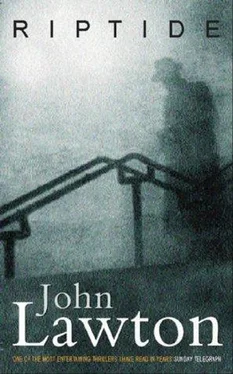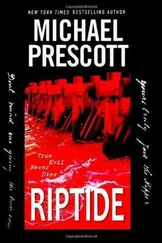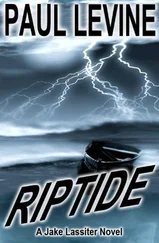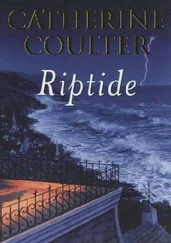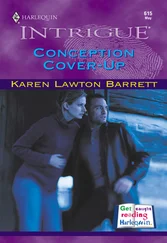‘Yes-whoever our man is, he extracted the letter without breaking the seal by inserting two small knitting needles into the top seam and rolling the letter around them until it was small enough to pass through the gap at the top where the gum has failed. When he’d read it he put it back the same way. It’s as old a trick as they come. I’m surprised you didn’t learn it in spy school. Alas for you spooks, the tension thus exerted remains in the paper rather as it would in a watch spring. Hence it curls. Would you care to read it?’
Cal read it. It was exactly the same as the other one.
‘Does this really get us anywhere?’ he asked.
‘Yes-of course it does. For one thing, it backs up what Stahl said. We’ve moved from odds-on that it was someone from the embassy to it being a dead cert, wouldn’t you say?’
‘I guess I would. But-what now?’
‘Now, a short list of probable suspects would help.’
‘Why not start with Shaeffer?’
‘Why not start without obvious prejudice? How many people work in that section of the embassy?’
‘A lot. Twenty, maybe thirty. A lot more than did before the war. I don’t even know some of their names.’
They sat an hour or more. Hardly anyone entered the embassy.
Cal said, ‘I hate to slow us down, but we’d have better luck if we came back and sat here from six until seven. Catch ‘em as they leave.’
Cormack had run off so many names. Troy was writing them down and trying to find a mnemonic in two or three words that ‘would fix a face in his mind. It struck him that the United States of America might have a little difficulty entering into a European war. It was too partisan a notion. Cormack had so far pointed out Lieutenant D’Amici-Troy had written down, short and ugly-Lieutenant Corsaro-short and handsome-Major Shaeffer-tall and broad, a bit like Johnny Weissmuller in Tarzan-two Sergeants Schulz-both as stout as Eugene Pallette-a Corporal Pulaski and a Captain Pulaski-they could have been twins-a Colonel Reininger-tall and thin, a bit Raymond Massey-a Captain Berg-utterly nondescript, his own mother couldn’t pick him out in a line-up, Troy thought-a Sergeant O’Connor and a Corporal Schickelgruber.
‘You’re kidding?’ said Troy.
‘Nope. Used to work with me in Zurich up to the new year. Absolutely won’t consider changing his name. Born Adolf Schickelgruber, he says, and he’ll die Adolf Schickelgruber.’
‘Adolf? His parents christened him Adolf?’
‘He’s in his twenties. Probably born in the last war. The only person who’d heard of the other Corporal Adolf Schickelgruber then was the paymaster in the Austrian infantry.’
‘Couldn’t you promote him? Anything but a corporal.’
‘Sure. If we live through this I’ll see to it personally. Hold on, here come another two.’
Troy peered out. A tall soldier and a short soldier were approaching, side by side. The tall one looked up at the sky and said something Troy could not hear or read. He’d bet they’d picked up the English habit of filling silence by talking inanely about the weather.
Cormack said, ‘Don’t know the tall guy, but I hate to tell you who the little one is.’
‘Let me guess, Corporal Mussolini?’
‘Close-that’s Joe Buonaparte. He accents the “e” and never fails to tell you there’s a “u” in his name. You’ve played this before, haven’t you?’
‘I’m grateful for the education into the great American melting pot, but I rather think this is getting us nowhere,’ said Troy. ‘There’s simply too many of them.’
‘I don’t see what else we can do.’
‘I can,’ said Troy. ‘We can set a trap for our chap.’
‘Trap? What sort of a trap?’
Troy stood outside a large block of working-class flats-the East London Dwelling Company’s Cressy Houses in Union Place, E1-a few yards from Stepney Green, a few more from the Stiltons’ house in Jubilee Street, a mile or so from Leman Street police station, where he had served as a uniformed constable before the war, and home to his old station sergeant, the recently widowed George Bonham. Troy climbed to the second floor and rapped at the door. Bonham towered over him, a duster in his hand, a floral pinny on his chest, a look of surprise on his face mingled with the unremitting sorrow which seemed to Troy to have been his lot since the Blitz and the death of his wife Ethel.
‘Freddie, long time no wotsit. Come in, come in, what brings you to this neck of the woods?’
Troy followed him to the sitting room, a box no more than ten feet by eight-the warm heart of a tiny flat in which George and Ethel had raised three sons. George had the china cabinet open. His wife’s collection of Crown Derby set out on the dining table.
‘I was just giving ‘em a bit of a going over. Didn’t like to see ‘em gathering dust.’
Troy “was sure they never gathered dust. This room was kept as a shrine to Ethel Bonham. In the six months since her death, George had changed not a thing. Troy would bet money that her clothes still hung in the mahogany-veneer wardrobe in the end bedroom, and that George still slept on one side of the bed only with two pillows side by side upon the bolster.
‘It’s almost six. Will you stay and eat?’
It was too early to eat-besides, Bonham was a dreadful cook. No man of his generation, and few of Troy’s, were in the slightest way capable of looking after themselves. Widowers were uncommon creatures, floundering through the latter life like beached sea monsters.
‘I’m afraid I can’t, George. It’s business. In fact I need your advice.’
Troy knew how flattered George could be by a simple lie, the slightness of exaggeration.
‘O’ course, Freddie. But I’ll put the kettle on all the same.’
Once the magic word ‘kettle’ had been uttered it was pointless trying to stop him. Tea was the universal salve-birth, marriage, death and all stations in between. Troy wondered how long Bonham’s tea ration lasted him. He made tea for two, black and sweet and of the consistency of molasses. You’d need a torch to see through it even before you put the milk in.
‘Well then, ask away. It’s not often you come to your old boss for a bit of advice.’
‘George, this has to be a secret. I’m investigating the death of Walter Stilton.’
‘Nuff said,’ said Bonham, nodding, tapping the side of his nose. Troy knew now that wild horses, let alone Scotland Yard, would not get him to talk. ‘He was a good ‘un, was Walter. A prince. And poor old Edna, left alone with all them kiddies. I’ve known Edna since I was a tot, y’know. Redmans Road Board School, 1894. Anything I can do for Walter, just name it.’
‘I need a private place.’
Bonham looked blankly at him.
‘Somewhere where we won’t be overheard or interrupted. Somewhere quiet.’
Bonham’s expression did not change.
‘Somewhere I can bend the law a little without old plod lumbering in.’
‘I see,’ said Bonham.
Troy wondered if he did.
‘You used to walk Tallow Dock down on the Isle of Dogs when you was on the beat, didn’t you? Well it got blown to buggery by the Luftwaffe just before Christmas. Hardly a house left with a roof on. Most of the warehouses are deserted now. You could set off a bomb down there and no-one would hear.’
Bonham paused as the word ‘bomb’, and the frequency with which they did go off these days, sank in.
‘There’s only one intact building left. Still got its roof-it was in use till last week. Might suit.’
‘Could I see it?’
‘Now?’
‘Car’s outside.’
Bonham stood. Troy tried and found a sharp pain shooting through his chest where Kolankiewicz had stitched him up.
Читать дальше
